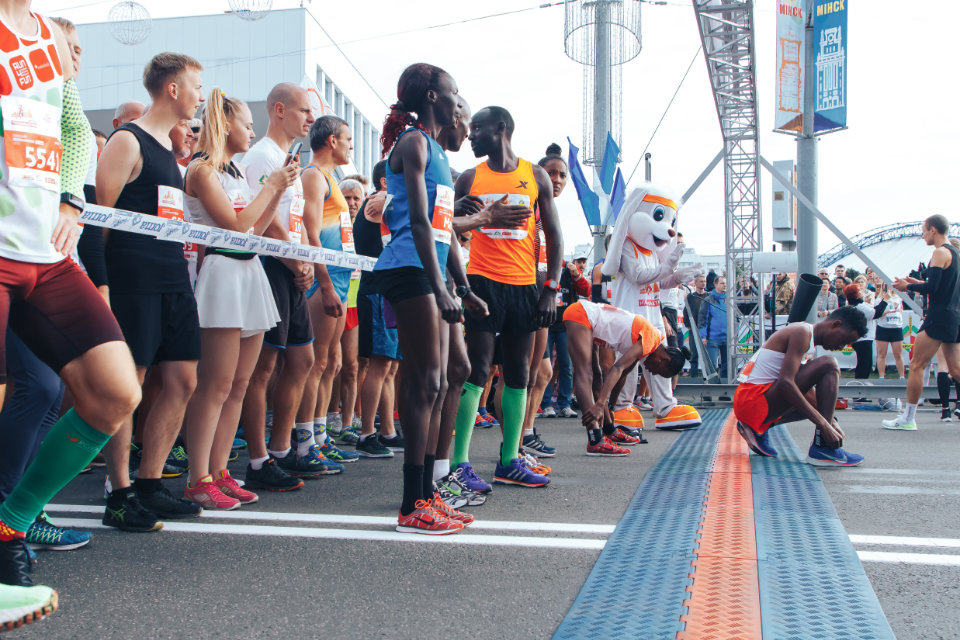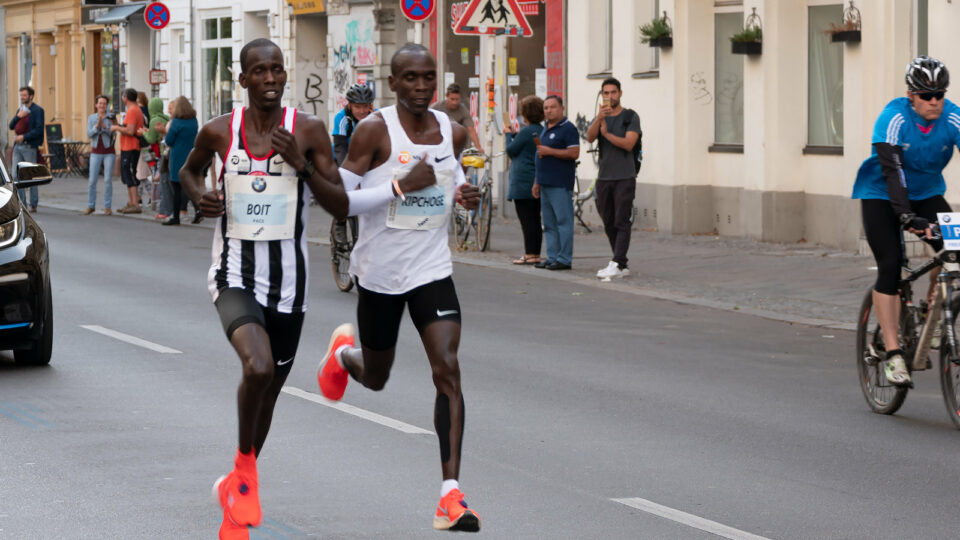Stepping up to the starting line of a marathon is an exhilarating moment. It’s a blend of anticipation, excitement, and perhaps, a touch of fear. However, to become a good marathoner isn’t just about lacing up your running shoes and hitting the pavement.
It involves meticulous preparation, endurance, mental strength, and above all, a profound commitment to the journey.
In this guide, we will walk you through a strategic marathon training plan, from understanding how to jog correctly, evaluating your current fitness level with a BMI calculator, mastering the proper running form, to incorporating strength exercises like stair climbing.
Table of Contents
Understanding Marathon Running
A marathon is not a sprint but a grueling 26.2-mile run that tests your physical stamina and mental fortitude.
Here’s a fun fact: The marathon gets its name from the legend of a Greek messenger, Pheidippides, who supposedly ran from the battlefield of Marathon to Athens to deliver news of victory.
The journey to become a successful marathoner demands consistent effort, resilience, and discipline. It isn’t about how fast you can run but about how long you can sustain your energy.
Did you know the slow and steady finishers, commonly referred to as ‘tortoise’ type of marathon runners, often enjoy the run more and have fewer injuries?
Setting Realistic Goals to Become a Good Marathoner
Embarking on a successful marathon journey involves more than just setting goals; it’s a scientific process that begins with building a solid foundation. Before aspiring to conquer marathons, one must first embrace the role of a runner. Scientific studies emphasise the importance of a gradual transition into running to prevent injuries and optimize performance.
To assess your readiness for marathon training, it’s essential to move beyond traditional metrics like BMI. Researchers suggest looking deeper into physiological indicators such as VO2 max, which provides a more accurate assessment of your cardiovascular fitness and running potential.
Your running targets should evolve in tandem with your physical condition. Starting with achievable milestones like 5K or 10K races not only helps in monitoring progress but also lays the groundwork for marathon success. Structured training plans, designed to prevent overuse injuries, can be a game-changer in your marathon preparation.
Before tackling marathons like the iconic Singapore Marathon, remember that becoming a good marathoner begins with becoming a proficient runner. It’s a journey grounded in science, marked by steady progression, and supported by data-driven decisions.

Essential Marathon Training Components
Marathon training is multifaceted and includes endurance training, strength training, speed work, and plenty of rest and recovery.
- Endurance Training: The backbone of marathon preparation is building stamina. Start with shorter distances and gradually increase your mileage each week.
- Strength Training: Incorporating exercises like stair climbing in your routine not only improves leg strength but also enhances your cardiovascular fitness.
- Speed Work: Once you have a solid running base, you can introduce speed workouts. These not only improve your pace but also build muscular strength.
- Rest and Recovery: Pay attention to your body’s signals. Ensure you get adequate sleep and schedule rest days in your training plan.
Nutrition for Marathoners
Proper nutrition is crucial in marathon preparation. Your diet should primarily consist of carbohydrates, the body’s preferred source of running fuel. Include whole grains, fruits, and vegetables in your meals.
Protein is also essential, particularly for post-run recovery and muscle repair. Include lean meats, dairy, or plant-based proteins in your diet.
Healthy fats (like avocados, nuts, and fish) should also be part of your meals. They provide a concentrated source of energy, help absorb vitamins, and reduce inflammation.
Timing is just as important as what you eat. Aim to eat a balanced meal 2-3 hours before long runs to give your body time to digest.
During your run, especially those that are longer than 60-90 minutes, you’ll want to refuel with easily digestible carbohydrates. Post-run, focus on protein to help repair muscles and carbohydrates to replenish energy stores.
Hydration is vital. Dehydration can severely impair performance and can be dangerous. Make sure to drink enough water throughout the day and during your runs.
Injury Prevention
Injury prevention is a key aspect of marathon training. Start with maintaining a proper jogging form. This reduces the stress on your joints and muscles, lowering your risk of injury.
A well-rounded training program can also help prevent injuries. Don’t just focus on running; include strength training and flexibility exercises to balance muscular strength and maintain joint health.
Listen to your body. If you feel pain or discomfort, it may be a signal that you’re overexerting or moving incorrectly.
Finally, rest is paramount. Overtraining can lead to injuries, so be sure to schedule rest days in your training plan and get plenty of sleep.
Mental Preparation
Preparing your mind for a marathon is akin to embarking on a journey. It’s a personal, multi-step process, and in the heart of it lies the magic of a mindset.
- Goal Setting: Your marathon journey starts by setting a clear, achievable goal. This is your beacon, guiding you throughout your training and the marathon itself.
- Visualisation: Spare a few moments each day to mentally traverse the marathon path. Visualise every stride, every breath, every cheer from the crowd, and that exhilarating moment of crossing the finish line. Feel the pride, the joy, the achievement – let it seep into your consciousness.
- Positive Self-Talk: In this journey, your biggest cheerleader is you. Replace each negative thought with a positive one. Remind yourself of the early mornings, the disciplined training, and the preparation that has shaped you. Trust in your journey and in your abilities.
- Relaxation Techniques: Embrace practices like deep breathing, yoga, or meditation. They are the balm to pre-marathon stress and a catalyst for focus and tranquillity. Let them become your quiet moments of self-reflection, helping you to align your body and mind.
- Develop a Mantra: Find a personal mantra that resonates with you, a power phrase that fuels your will to keep moving forward when the race becomes challenging. This mantra, much like your mindset, will be your invisible strength, pushing you towards your marathon goal.
Remember, the magic of a mindset can make the difference between simply running a marathon and truly experiencing a marathon. Harness its power.

The Role of Gear
Choosing the right gear can significantly impact your comfort and performance during a marathon. Your running shoes are arguably the most important piece of gear. They should be well-fitted and suitable for your gait and foot type.
Clothing is also important. Opt for materials like ‘dri-fit‘ for your running t-shirt, which wicks sweat away from the body, helping you stay cool and dry.
Don’t forget about accessories. Hydration packs can be helpful for long training runs, and a good pair of running socks can prevent blisters. A hat or visor and sunglasses might be necessary for sunny weather.
Pre-Race Preparation and Race-Day Strategy
The preparations for the marathon don’t start a day before the event, but weeks prior. This crucial period, often referred to as ‘tapering’, involves reducing your training volume to allow your body ample time to recover and build up energy reserves for the main event, the marathon.
As part of your pre-race preparation, planning your race-day strategy is paramount. Consider whether you’ll be running with a ‘pacer’ or going solo.
Running with a pacer has its advantages: it can help you maintain a consistent pace, manage your energy efficiently, and provide companionship during the challenging moments of the race.
On the other hand, running solo can offer you the flexibility to adjust your pace according to your comfort, the freedom to run at your own rhythm, and the chance to fully immerse yourself in the personal journey of the marathon.
Determine the pace you aim to maintain throughout the race. Also, plan your nutrition carefully – know when and what you’ll eat before and during the race.
On the actual race day, adhere to your plan as closely as possible. Start with a proper warm-up before the race commences, and remember to manage your pace wisely – it’s easy to get caught up in the adrenaline of the starting line. Remember, a marathon isn’t just a race; it’s a test of endurance, not speed.
By following these guidelines and preparation strategies, you’re not just training to become a marathoner – you’re getting ready to cross the finish line with confidence and a story of personal triumph.”
Embarking on Your Marathon Journey Today
The journey to becoming a proficient marathoner may indeed be filled with challenges, but rest assured, the rewards are immensely gratifying.
Embrace the process, remain patient, and always remember: every step you take is one step closer to progress.
So, what’s stopping you? Are you ready to take that first stride towards your marathon goal today?
How can I become a good marathoner?
Becoming a good marathoner involves consistent training, adhering to a structured marathon training plan, maintaining a balanced diet, preventing injuries through proper jogging form and regular rest, and mental preparation.
What does a marathon training plan involve?
A marathon training plan usually involves a mix of different types of runs, strength training, cross-training, and rest days, spread across several months. The plan gradually increases in intensity to build stamina.
What is the importance of diet in marathon training?
A balanced diet provides the necessary energy for training and aids in recovery. It should include carbohydrates for energy, protein for muscle repair, and healthy fats for satiety.
How can I prevent injuries while training for a marathon?
Injuries can be prevented by warming up and cooling down properly, maintaining proper jogging form, using a BMI calculator to ensure a healthy weight, and incorporating rest days into your training plan.
How can I prepare mentally for a marathon?
Mental preparation involves setting realistic goals, developing a positive mindset, visualisation techniques, and dealing with discomfort and challenges during the race.





